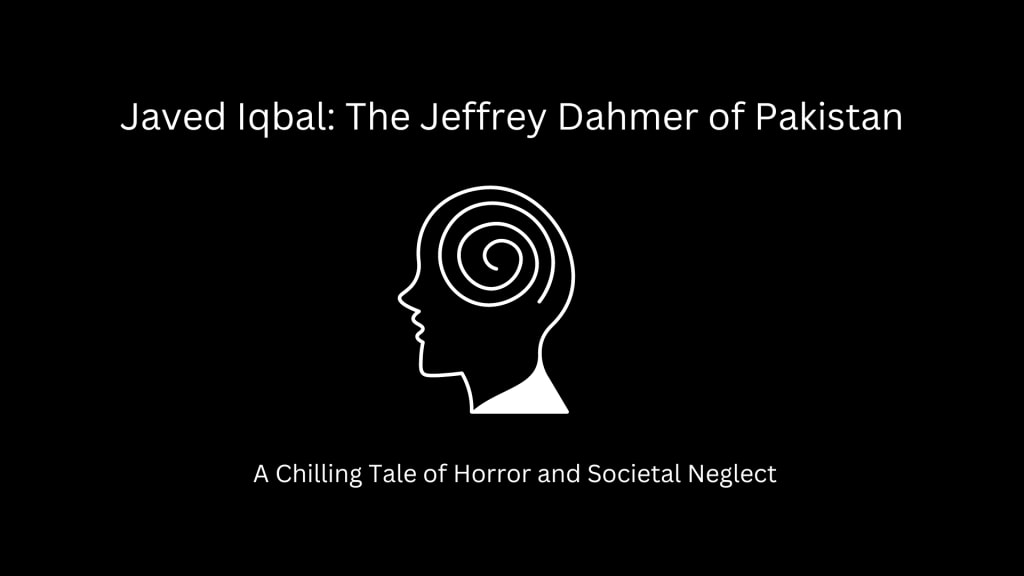"Javed Iqbal: The Jeffrey Dahmer of Pakistan - A Chilling Tale of Horror and Societal Neglect"
Javed Iqbal: A Notorious Pakistani Serial Killer.

Note: This article may contain disturbing content and is not suitable for all audiences.
Javed Iqbal: The Jeffrey Dahmer of Pakistan - A Chilling Tale of Horror and Societal Neglect
Javed Iqbal's crimes shocked the nation and the world when they were uncovered in the late 1990s. The scale and brutality of his killings drew comparisons to infamous serial killers like Jeffrey Dahmer and Ted Bundy, and the sheer number of victims he claimed was almost beyond belief.
Born into a wealthy family, Iqbal had a troubled childhood. His father was abusive, and Iqbal struggled with mental illness from a young age. He was reportedly diagnosed with schizophrenia and depression, and he was known to be a heavy drinker.
Despite his wealth and privilege, Iqbal's mental health struggles were largely ignored. His family did little to address his issues, and the society he lived in was ill-equipped to provide the kind of support and care he needed.
As a young man, Iqbal's troubles continued. He struggled to hold down a job, and he spent much of his time drinking and engaging in petty crime. It was during this period that he began to develop a twisted obsession with young boys.
Iqbal would lure his victims into his home with promises of money or gifts, and then subject them to unspeakable horrors. He would rape and torture them, sometimes for days on end, before finally killing them. His preferred methods of torture were horrific - he would subject his victims to acid baths and electrocution, and he was known to cut off their limbs while they were still alive.
But perhaps even more disturbing than the nature of Iqbal's crimes was the fact that he was able to get away with them for so long. His victims were mostly poor and from marginalized communities, and their disappearances were not taken seriously by the police or other authorities.
It wasn't until a young boy managed to escape from Iqbal's clutches and report him to the police that his crimes were finally uncovered. When the police raided his home, they found evidence of his atrocities - a blood-soaked room filled with torture devices and the remains of his victims.
The trial that followed was one of the most sensational in Pakistan's history. The nation was transfixed by the horror of Iqbal's crimes, and many people were appalled by the lack of support and care he had received for his mental health issues.
Ultimately, Iqbal was found guilty of his crimes and sentenced to death. But his sentence was never carried out - just over a year after his conviction, he was found dead in his cell.
The official cause of Iqbal's death was reported as suicide, but there are suspicions that he was murdered by other inmates or that he was killed by someone who was unhappy with the publicity surrounding the case.
Regardless of how he died, the legacy of Javed Iqbal's crimes lives on in the collective memory of the Pakistani people. His name is still spoken in hushed tones, a reminder of the horrors that can be unleashed when darkness is allowed to fester unchecked.
But perhaps the most important lesson to be learned from Iqbal's crimes is the need for greater support and care for those who struggle with mental illness. Had Iqbal received the help he needed, perhaps his atrocities could have been prevented.
As Pakistan and the world continue to grapple with the fallout from Javed Iqbal's crimes, it is clear that his legacy will endure for many years to come. But by learning from the mistakes of the past, we can strive to create a better future - one in which the darkness within us all is met with compassion, understanding, and support.
About the Creator
Tania Saleem
Hi, I'm Tania.
Passion for travel and trying new foods.
Love learning about different cultures and meeting new people.
Belief in the power of education and empathy to bring people together.






Comments
There are no comments for this story
Be the first to respond and start the conversation.